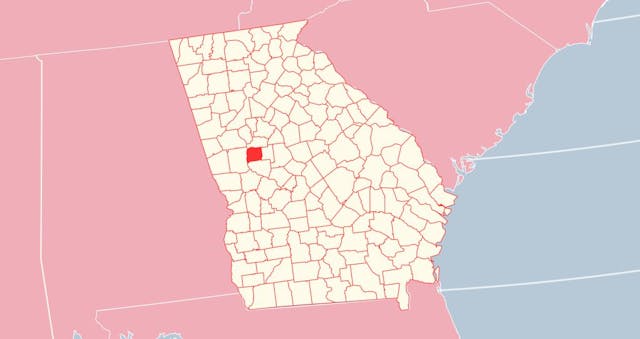Rehabs in Pike
Pike County is located in the west-central part of the US state of Georgia. Its administrative center is Zebulon. According to the 2010 US census, the region had a population of 17,896.
The opioid epidemic has become an epidemic in the state of GA and across the nation. As of the Centers for Disease Control and Prevention, over 48,5 million residents of the US have used illicit drugs or misused prescription drugs. Moreover, the US has never seen higher numbers of drug overdose fatalities before. The major cause of these deaths is opioid misuse. So, anyone can be affected by opioid misuse, and the important thing to remember is to apply for expert care as soon as possible.
As of the survey of the Institute of Health Metrics and Evaluation (IHME), in 2014 the mental and substance use disorders mortality rate is 5,5 for women and 17,7 for men (per 100,000 population). So, there is a certain need to build strong and quality support for the locals who want to fight addiction. There are no various drug and alcohol rehabs in Pike County. Hence, for the complete addiction recovery course, you would have to search treatment centers across the county.
Substance Abuse Evaluation
To know what kind of addiction you have or do you need professional care or not you should pass a substance abuse evaluation procedure. The latter consists of a special questionnaire and screening. A member of a licensed staff will identify the type of your dependence and its severity by asking you questions. Thus, you should answer them honestly to have the correct picture of your drug abuse history. After assessing your needs, the professional will offer you an individual recovery plan.
Available Treatment Centers and Programs
Even if you won’t be able to find the right rehab in Pike County, there are still available treatment options across this province. So, if you or your loved one suffers from addiction, search for the facility and choose one that covers your unique needs. Generally, rehabs offer the following stages of the healing process:
Substance abuse evaluation
Detox
Inpatient or outpatient care plan
Aftercare
There are also some intermediate programs, but the complete course typically involves the above-mentioned stages.
Detox
Every drug and alcohol addiction treatment should start with detox. Generally, it lasts from 3 to 10 days. Under the managed environment and around-the-clock medical support, your body will be cleaned of substances. This process is to cause painful and unsafe withdrawal symptoms. Hence, the detox services are here to guarantee safe and comfortable withdrawal.
Inpatient Care
In case of having long-lasting and severe dependence, you should enroll in inpatient/residential rehab. Patients have to reside in the hub and be fully concentrated on the recovery process. In other words, the person appears under structured care with strict scheduling. Patients typically spend from 1 to 3 months in inpatient rehab. They attend group or individual therapies, 12-step meetings, sports, arts, etc. This plan has the highest effectiveness.
Outpatient Care
After completing residential therapy most people need further intervention. An outpatient hub is a perfect place for them. It has patients with mild or newly started dependencies too. This type of care does not require patients to stay at the facility. They only have to pay weekly visits to the hub and spend there from 3 to 5 hours daily. After the end of sessions, the person returns home and continues with daily responsibilities. Outpatient care offers flexible scheduling and wide independence.
Aftercare
People are to experience relapse prevention challenges during the first months after leaving rehab. So, ongoing support gains unique importance in the process of maintaining sobriety. Several aftercare plans are available in GA. The latter involve sober living houses, peer support groups, Alcoholics (AA) and Narcotics (NA) Anonymous meetings, etc.
Payment
Addiction therapy can be the most successful investment of your life, as it brings your health and close people back to you. So, even if the prices of the healing programs are high, you should find a financing option to manage them. First of all, people use their private health insurance plans. Secondly, there are also public insurance plans available, such as Medicaid, Medicare, and Tricare. Then, you may also enter state-funded centers that offer services at low cost or no cost at all. Other financial aid projects include fundraising, medical loans, grants, scholarships, etc.

